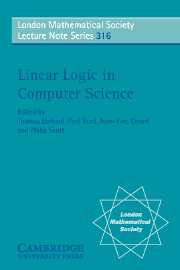Preface
Published online by Cambridge University Press: 17 May 2010
Summary
This volume is published in honour of the Azores summer school on Linear Logic and Computer Science held August 30 – Sept. 7, 2000 in St. Miguel, Azores. It can be considered as the third in a series, following a volume dedicated to the Cornell Linear Logic workshop of 1993 published as vol. 222 in the LMSLNS series of Cambridge University Press, and volumes dedicated to the Tokyo meeting of 1996 published as vol. 227(1–2) and 294(3) of Theoretical Computer Science. The summer school was attended by students and researchers from the different sites of the EU Training and Mobility of Researchers project “Linear Logic in Computer Science” (ERBFMRX-CT-97-0170, 1998 – 2002). The Organizing Committee consisted of: V. Michele Abrusci (University of Rome), Nuno Barreiro (University of Lisbon), and Jose Luiz Fiadeiro (University of Lisbon). The school included a series of tutorials, together with thematic sessions covering applications and new directions.
The main purpose of this book is twofold: to give a detailed overview of some well-established developments of Linear Logic under the guise of four tutorials, and to present some of the more recent advances and new directions in the subject through refereed contributions and invited papers. This book does not pretend to exhaustively cover the field of Linear Logic. In the spirit of the TMR “Linear” network, of which the Azores summer school was the climax, we decided to pay particular attention in this volume to the connections of Linear Logic with Computer Science.
We thank the authors of the various contributions for their wideranging and accessible presentations.
- Type
- Chapter
- Information
- Linear Logic in Computer Science , pp. vii - viiiPublisher: Cambridge University PressPrint publication year: 2004



